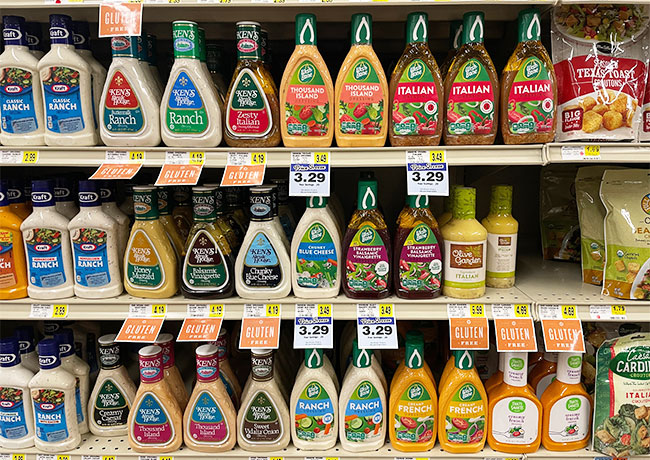The One Inflammatory Ingredient Experts Say Is ‘Sabotaging’ Your Weight Loss Goals, And It’s Hiding In Everything From Dressings To Dips: Refined Seed Oils
There is an ingredient that has the health and fitness community raging over, as they believe it can do more harm than good regarding weight loss progress, and they’re found in numerous different food products.
Refined seed oils like vegetable and canola oil are a hot topic right now, as while some people think they don’t have much of an impact on your health, other nutrition experts would argue that they can ‘sabotage’ your health and fitness journey.
Celebrity nutritionist JJ Virgin and other health experts have put out a lot of information on how these oils, which are found in everyday household products like salad dressing and seemingly healthy snacks, can hinder your weight loss products. Read more about why below.

The Ultimate Mother’s Day Gift Guide: 35+ Perfect Picks for Every Mom (and Budget!)

Shutterstock
Health Experts Say Refined Seed Oils Can Slow Down Your Weight Loss
If you didn’t know, refined seed oils are defined as plant-based vegetable oils that go through a refining process. Besides generic vegetable oil, canola, soybean, and corn oil also fall under this category.
These oils are often used for cooking but also in various store-bought and premade products that are likely in your pantry right now. Like most fat sources, consuming these oils is fine in moderation, but if you’re on a weight loss journey, some health experts advise avoiding them when possible.
In her YouTube video, “Why Seed Oils Are Sabotaging Your Health,” celebrity nutritionist JJ Virgin speaks with Dr. Cate Shanahan, MD, about the downsides of consuming seed oils and why they are considered “oxidative stress” in a bottle.
“Vegetable oils are the reason processed food is unhealthy,” says Dr. Shanahan in her interview with Virgin.
“They put the ‘junk’ in junk food.”
The nutritionist and family physician then began talking about the “Hateful Eight” seed oils that can do more harm to your health than good when frequently ingested, including corn, canola, cottonseed, soy, sunflower, safflower, rice bran, and grapeseed oil, noting that the first six are essential to memorize, as they can be responsible for some lousy symptoms and poor health.
The two experts mentioned that these oils are inflammatory and can create “toxic byproducts” in our bodies, contribute to insulin resistance, make it harder to lose weight, and often contain harmful compounds created while they are processed. Dr. Shanahan also found that her cravings for sweets were reduced when she cut out seed oils.
Refined seed oils are used in so many different food products, whether they’re actually part of a recipe or simply used for the cooking or frying process. They’re even found in foods that are associated with health or weight loss, like salad dressings or certain protein bars. Not only that, but they’re used in all sorts of popular snacks, like dips, popcorn, chips, crackers, and more.
While they can sometimes seem impossible to avoid, the goal is to focus on healthier sources of fat and limit how many refined seed oils you consume during the day.

Shutterstock
There Are Healthier Sources Of Fat To Use While Trying To Lose Weight
If you’re trying to lose weight and don’t want to risk worsening your condition or slowing down your progress with a diet that’s heavy in seed oils, there are other sources of fat to cook with and enjoy. These fat sources are more natural and can help you feel a lot better as you work hard to improve your health.
Dr. Josh Axe, DC, DNM, CNS, wrote in his article, “Are Seed Oils Good or Bad for You? Pros, Cons & Healthy Alternatives,” that there are plenty of “health-promoting” options to use in place of seed oils while cooking or using recipes. For instance, he wrote that extra-virgin olive oil is “rich in monounsaturated fats and antioxidants, ideal for salads and low-heat cooking.”
Olive oil is also a great alternative, as it’s known for being anti-inflammatory and contains polyphenols that can be beneficial to your heart health. Avocado oil is also an excellent neutral oil to use for cooking and baking, as it contains healthy fats and can withstand high temperatures.
There’s also coconut oil, which can provide a slightly sweeter taste, and various nut oils, like almond and walnut oil. Even butter has a few health benefits worth considering, as certain variations aren’t as processed as seed oils, but it is still high in calories and saturated fats.
Something to remember is that you won’t be able to ‘not’ lose weight if you occasionally eat products with refined seed oils in them. Still, it’s important to remember that you should consider limiting how often you consume them if you want to make lasting progress and avoid pesky symptoms like inflammation and insulin resistance.


